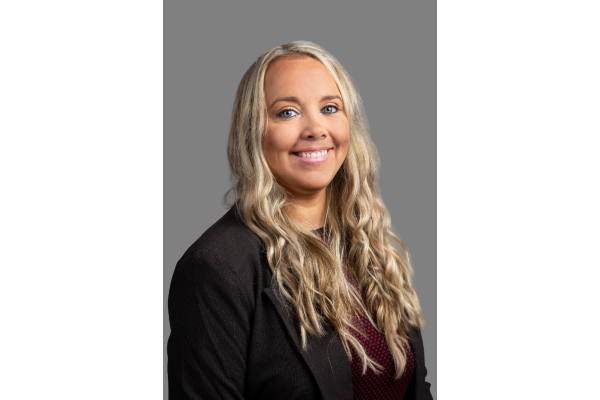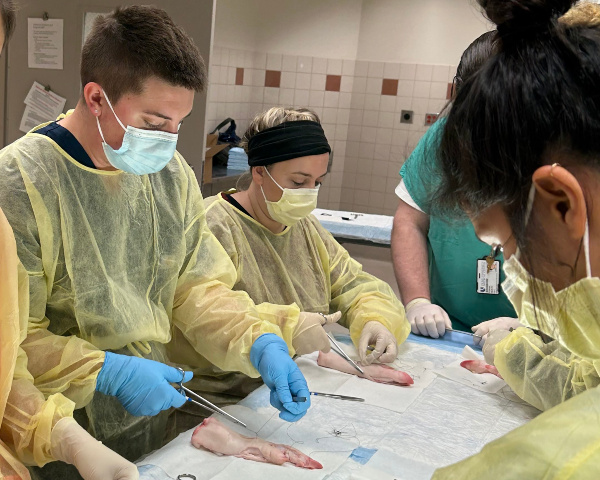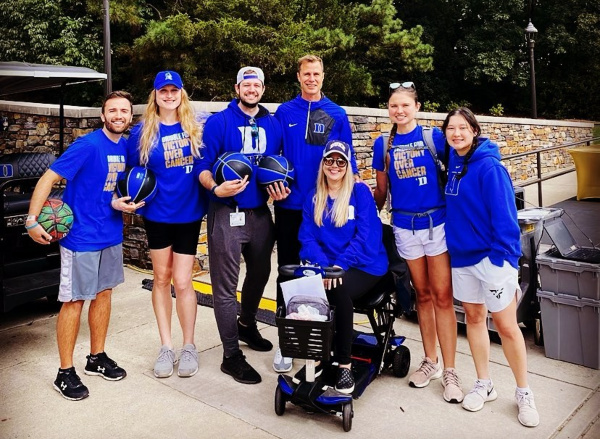Second Year Student Blog: Jamie Schwartz

Did you know July was Disability Pride Month?
July was picked to honor the anniversary of the passing of the Americans with Disabilities Act and to celebrate the accomplishments, experiences, and adversity faced by individuals with disabilities.
My own recent experiences have made me realize how little I used to comprehend and appreciate the magnitude of the challenges that people with disabilities or chronic illnesses face daily, but also how important it is to ask for help when we need it and acknowledge the support we receive. I believe there is still a lot of stigma and discouragement toward individuals with chronic health issues and disabilities working in health care fields, and I would like to see that change. It is absolutely possible not only to manage professional programs such as Physician Assistant (PA) school but even to excel at them. Providers with different abilities and chronic illnesses bring a unique perspective and understanding that can enhance the experience of our future patients and I would love to see the field be more inclusive.
I think Duke is making strides to help promote this vision.
Partway through my original clinical year, I faced medical complications and had to take a leave of absence. I developed several disabilities due to my illness and was unsure if I would be able to return and finish my dream of becoming a PA.
Even during my leave of absence, the amount of support I received from the school was more than I ever expected. I had regular calls and texts from my advisor and the director of clinical education every 2-4 weeks where they checked in on how I was doing, what progress I was making, and helped set clear goals, timelines, and deliverables to ensure that I was set up for success when I returned to school.
Just prior to my return, I met with both the Student Disability Access Office (SDAO) and the PA program’s disability service liaison multiple times.
I recommend starting this process as early as possible since SDAO is busy at the start of the year, and you will need time to schedule medical appointments and fill out paperwork. Meetings are scheduled through the SDAO website and can be in person or virtual. They helped me develop a list of reasonable accommodations and guided me on the next steps. This was important because I truly had no idea what types of accommodation were available and considered reasonable.
You will work with the PA program liaison to discuss implementing your requested accommodations. The liaison manages the sharing of approved accommodations with the faculty as needed, the scheduling of accommodations for specific activities, and other day-to-day situations as they pop up. Both SDAO and the PA program are always willing to go back and make changes if needed. Chronic illness can be very dynamic and your needs may change over time, so I am grateful that Duke recognizes that.
There is such a variety of accommodations available, and I think a hurdle I faced was not knowing what to ask for.

There are options for exams such as increased testing time, headphones, extra breaks, and private testing spaces. During lectures, I have reserved seating in the front of the classroom and always have access to a chair, water, snacks, and a personal fan. There is software like ZoomText to increase font sizes or Otter to record audio and transcribe it for help with note-taking. During the clinical year, you might ask for schedule adjustments.
Outside of the learning environment, you can also request ADA seating accommodations for sporting events; just get a regular grad student ticket and then email SDAO to request a ticket change to accessible seats.
This is definitely not an all-inclusive list; there are many more options depending on your individual needs and they will help determine the best fit for your situation.
The program is supportive of all learners and provides options such as a quiet alcove right outside the lecture hall with couches and a TV that displays the current lecture. Lectures are recorded and posted within 1-2 days on the class website. During the didactic year students have a half day on Tuesdays, which leaves us free to schedule medical appointments or schedule exams based on personal accommodations. All students have access to learning/study technique consultations, and advisors are active in offering help to those who are struggling.
The program's building is very accessible, and they are open to ideas to further increase that accessibility. One thing I was nervous about before my return was anatomy lab. The bus used to travel from the PA program to the main campus for labs is accessible to both my rollator-walker and motorized scooter. There was always a stool next to my cadaver station and we lowered my group's table height so that I could easily sit when needed and still participate. The faculty is always considerate and supportive, making sure that I feel empowered to ask for help when I need it, but in a way where I simply feel cared about and never coming across as ableism.
Considerations of individual needs and accommodations continue into the clinical year with thoughtful rotation placements.
My main advice to individuals who are seeking a career in health care is to advocate for your needs, seek the support that is offered, and be flexible to make adjustments as needed.

It is important to have support from your faculty, your cohort, and peers with similar situations, so I encourage you to seek out these connections. I found individuals at other PA programs through social media, and I'm not sure I would have made it through this past year without their advice.
There may be days/weeks where you do have to push yourself to your limits but be sure to then give yourself the time to recover after. If studying takes you more hours to get through the same amount of material, still be sure to schedule in some personal time for balance to maintain your mental health and energy levels.
When I returned to school last summer, I truly thought I would only be able to complete my school work with no extracurriculars. I mentally prepared myself that I would likely struggle just to pass. Prior to developing my illness, I had always been the type to be very involved and keep myself busy, so I knew that would be tough for me to accept. However, with the incredible amount of support I received from the program and my peers, I was not only successful in my academics, but also the vice president of our class Stead Society. I participated in various volunteer events and professional extracurriculars the program offers. I even attended the national AAPA conference and participated in the iScan ultrasound competition.
I hope that my success can be an inspiration to someone out there who is feeling afraid or discouraged to seek a career as a physician assistant. You can do it, and you can do it well. I also hope that the whole PA profession follows the example of the Duke PA Program and continues to realize the value of promoting accessibility to increase the diversity of providers.
Jamie Schwartz
Stead Society Vice President Class of 2024
Jamie Schwartz is a first-year student with the Duke Physician Assistant Program. Email jamie.schwartz@duke.edu with questions.
Editor’s note: Duke Physician Assistant Program students blog monthly. Blogs represent the opinion of the author, not the Duke Physician Assistant Program, the Department of Family Medicine and Community Health, or Duke University.